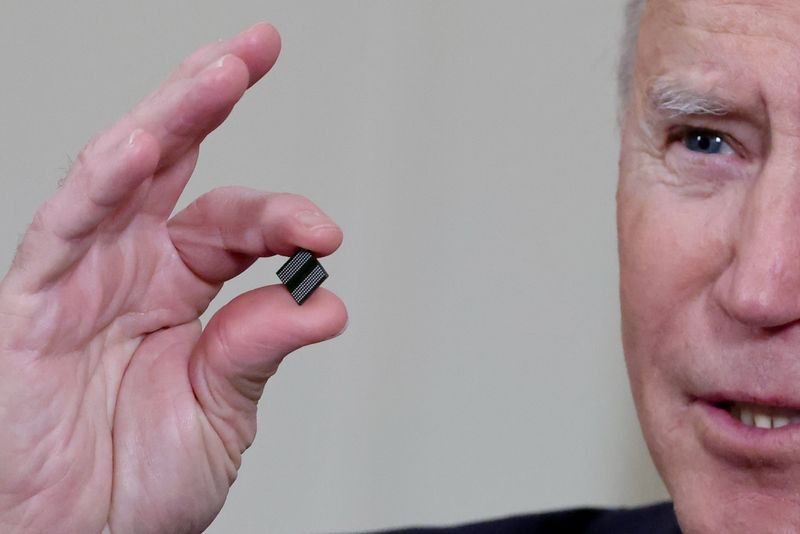By Nandita Bose
WASHINGTON (Reuters) - U.S. President Joe Biden told a meeting with executives from major companies to discuss the global chip shortage on Monday that he has bipartisan support for legislation to fund the semiconductor industry.
He will urge Congress to invest $50 billion in semiconductor manufacturing and research as part of his broader focus on rebuilding U.S. manufacturing as a powerhouse for the world's largest economy - and a source of good-paying jobs - after years of declining investments and productivity growth, a senior administration official said.
"Today I received a letter from 23 senators, bipartisan and 42 House members, Republican and Democrat, supporting the chips for America program," Biden said at the beginning of the meeting.
White House spokeswoman Jen Psaki told reporters that no immediate decision or announcement was likely to come from the meeting, which she described as a time for the president "to hear directly from companies about the impacts, what would help the most through this period of time."
The White House meeting is billed as the "CEO Summit on Semiconductor and Supply Chain Resilience" and includes White House national security adviser Jake Sullivan and National Economic Council Director Brian Deese.
Biden is expected to push his $2 trillion infrastructure plan, which includes $300 billion aimed at expanding manufacturing, especially in disadvantaged areas and communities of color through loans, grants, investments and the targeted use of federal procurements.
While the proposed investments will take time to implement, the administration is also seeking "short-term and medium-term solutions that will be discussed during the summit," the official said. No further details were immediately available.
Intel Corp (NASDAQ:INTC) Chief Executive Officer Pat Gelsinger attended the meeting virtually and told Reuters that Intel is in talks with suppliers of automotive chips to produce their chips in Intel's factories. The goal would be to start producing chips within six to nine months to address a shortage that has idled assembly lines at some U.S. automotive plants.
"We're hoping that some of these things can be alleviated, not requiring a three- or four-year factory build, but maybe six months of new products being certified on some of our existing processes," Gelsinger told Reuters. "We've begun those engagements already with some of the key components suppliers."
As of midday Friday, 19 major companies had agreed to send executives, including General Motors (NYSE:GM) Chief Executive Mary Barra, Ford Motor (NYSE:F) CEO Jim Farley and Chrysler-parent Stellantis NV CEO Carlos Tavares.
The "summit reflects the urgent need to strengthen critical supply chains," Deese said in a statement.
Commerce Secretary Gina Raimondo will also take part, as well as executives from GlobalFoundries, PACCAR Inc (NASDAQ:PCAR), NXP (NASDAQ:NXPI) and Taiwan Semiconductor Manufacturing Co, AT&T (NYSE:T), Samsung Electronics (LON:0593xq) Co, Google-parent Alphabet (NASDAQ:GOOGL) Inc, Dell Technologies, Intel Corp, Medtronic (NYSE:MDT), Northrop Grumman (NYSE:NOC), Hewlett Packard Enterprises, Cummins and Micron Technology (NASDAQ:MU).
A U.S. auto industry group last week urged the government to help and warned that a global semiconductor shortage could result in 1.28 million fewer vehicles built this year and disrupt production for another six months.
Over the weekend, GM canceled more truck production shifts at two U.S. plants.
"Trying to address supply chains on a crisis-by-crisis basis creates critical national security vulnerabilities," Sullivan said in a statement.
Automakers have been hit particularly hard by the global chip shortage after many canceled orders when their plants were idled by the coronavirus pandemic.
When they were ready to resume production, they found chipmakers were busy fulfilling orders for the consumer electronics industry, which has seen demand for premium devices - both for work and leisure - boom as people spent more time at home.
Broadband internet, cellphone and cable TV companies also face delays in receiving "network switches, routers, and servers," according to an industry group.

Later this week, the Senate Commerce Committee will hold its first hearing on a bipartisan measure to bolster technology research and development efforts in a bid to address Chinese competition.